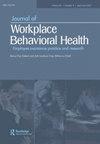阻止员工恢复需求与离职意向:良性组织实践通过工作能力的保护作用
IF 0.8
Q3 PUBLIC, ENVIRONMENTAL & OCCUPATIONAL HEALTH
引用次数: 0
摘要
在职业领域,后新冠肺炎时代的特点是员工心理健康状况恶化,“大辞职”或“大辞职”导致一些活动部门出现劳动力短缺。在这方面,确定各组织可以采取行动的工人心理健康和工作人员留任因素是一个至关重要的问题。良性组织实践的新整合构建为解决这一问题提供了良好的前景。这项研究的目的是双重的。一是探讨良性组织实践与员工恢复需求和离职意向之间的关系。二是检验工作能力在二者之间的中介作用。我们对521名在法国公司工作的个人进行了实证研究。结构方程模型表明,良性组织实践与员工的恢复需求和离职意愿呈负相关。重新抽样分析表明,良好的组织实践可以通过提高工作能力提供保护作用,从而降低对恢复和离职意愿的需求。讨论了理论贡献、局限性和实际意义。关键词:良性组织实践;恢复需求;离职意向;工作能力;因此,本研究的设计符合《关于涉及人类研究的赫尔辛基宣言》(世界医学协会,Citation2013)。声明作者没有与本文内容相关的利益冲突需要声明。伦理批准声明本研究方案已获图尔大学图尔-普瓦捷研究伦理委员会(CER-TP n°2019-09-04)批准。数据可用性声明本研究使用的数据集可向通讯作者索取。本文章由计算机程序翻译,如有差异,请以英文原文为准。
Preventing workers’ need for recovery and turnover intentions: The protective effect of virtuous organizational practices through work ability
AbstractIn the occupational field, the post-COVID-19 era is characterized by a deterioration of employees’ psychological health, and the “Great Resignation,” or “Big Quit,” leading to labor shortages in some activity sectors. In this context, identifying the factors of workers’ psychological health and staff retention on which organizations can act is therefore a crucial issue. The new integrative construct of virtuous organizational practices offers promising prospects to address this issue. The aims of this study were twofold. The first was to explore the relationships between virtuous organizational practices on the one hand, and employees’ need for recovery and turnover intentions on the other. The second was to test the mediating role of work ability between them. We conducted an empirical study with a sample of 521 individuals working in French organizations. Consistent with our assumptions, structural equation modeling revealed that virtuous organizational practices were negatively associated with employees’ need for recovery and turnover intentions. Resampling analyses showed that virtuous organizational practices could provide a protective effect by promoting work ability, which in turn could decrease the need for recovery and turnover intentions. Theoretical contributions, limitations, and practical implications are discussed.Keywords: Virtuous organizational practicesneed for recoveryturnover intentionwork ability Consent statementParticipants then signed an informed consent form. In this way, the study was designed in compliance with the Helsinki Declaration on Research Involving Human Beings (World Medical Association, Citation2013).Disclosure statementThe authors have no conflicts of interest to declare that are relevant to the content of this article.Ethics approval statementThe study protocol was also approved by the Tours-Poitiers Ethics Committee for Research of University of Tours (CER-TP n° 2019-09-04).Data availability statementDatasets used for this study are available on request to the corresponding author.
求助全文
通过发布文献求助,成功后即可免费获取论文全文。
去求助
来源期刊

Journal of Workplace Behavioral Health
PUBLIC, ENVIRONMENTAL & OCCUPATIONAL HEALTH-
CiteScore
2.40
自引率
6.70%
发文量
14
期刊介绍:
The Journal of Workplace Behavioral Health, retitled from Employee Assistance Quarterly to better reflect its expanded focus, presents innovative research, applied theory, and practical information to keep workplace human service administrators, counselors, and consultants up to date on the latest developments in the field. This refereed journal is an essential guide to best practice and research issues faced by EAP professionals who deal with work-related and personal issues including workplace and family wellness, employee benefits, and organizational development.
 求助内容:
求助内容: 应助结果提醒方式:
应助结果提醒方式:


